Labour migration may benefit employers and workers, and across the world recruitment agencies play an important role in matching migrant workers with available jobs. However, while the cost of recruitment of higher skilled migrant workers tends to be paid by employers, millions of lower skilled migrant workers continue to pay recruitment fees and related costs for job placement abroad in sectors such as agriculture, construction, garments and manufacturing, hospitality and transportation. Especially where these fees and costs to migrant workers are inflated, they may result in debt, and situations akin to forced labour. Recruitment-related deception, contract substitution, placement in undeclared work and abuse of vulnerability during the recruitment process (especially of migrants in irregular situations) are other ways through which migrant workers may be exploited.
These recruitment-related abuses are widely documented and contribute to a multi-billion dollar business where culprits appear to be able to operate with a high level of impunity and where few countries at best report comprehensive evidence of effective law enforcement against unscrupulous recruiters. Such recruitment-related abuse affects the lives of millions, and is an impediment to achieving labour-related targets under the Sustainable Development Goals (SDGs) – in particular SDG target 8.7 (elimination of all forms of forced labour and human trafficking) and SDG target 8.8 (protect labour rights and promote safe and secure working environments of all workers, including migrant workers, particularly women migrants (…)) – and compromises countries’ obligations pertaining to the ILO Fundamental Principles and Rights at Work.
Regulation and monitoring of recruitment modalities – including operations of private recruitment agencies – are key to making progress towards decent work for all, including migrant workers. Although the social partners as well as non-governmental organizations can contribute to recruitment monitoring through self-regulation mechanisms, awareness raising and advocacy campaigns, it is States who bear the primary responsibility for regulating and monitoring recruitment modalities, including the operations of private recruitment agencies.
Labour inspectorates’ prime mandate is to monitor conditions of work. In addition, they and related administrative authorities can play a critical enforcement role towards fair recruitment, through monitoring of private recruitment and placement agencies, detection of abusive recruitment practices, processing of complaints and application of sanctions in both countries of origin and destination of migrant workers. This is recognized in recent international standards (see box 1).

